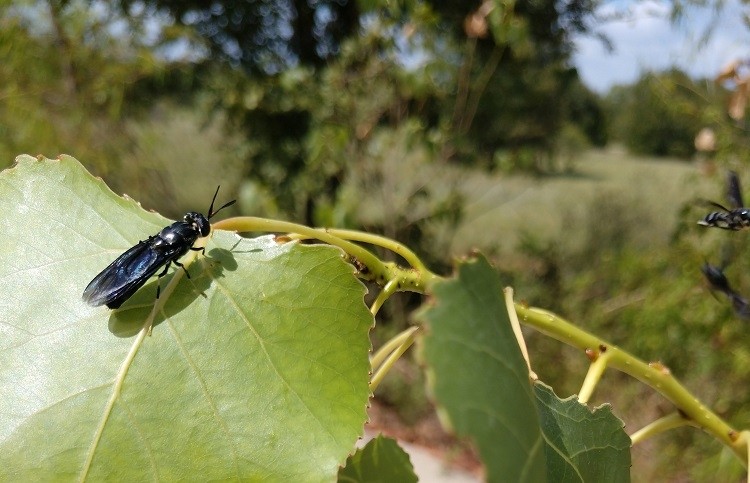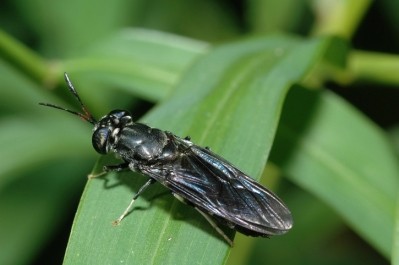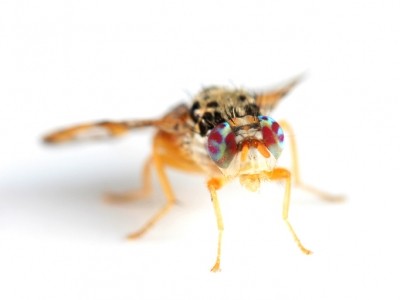Black soldier fly tech aims to simplify, specialize production

The black soldier fly (BSF) bullet technology was developed at Texas A&M University by Jeff Tomberlin and his research team. The unit allows for the larvae to be kept in a juvenile state for an extended period before being used.
Tomberlin, professor in the department of entomology at Texas A&M and director of EVO Conversion Systems, LLC, said the larvae "is the resource we’re going to be utilizing as a feed product, so we have to really understand how to optimize production and how to make sure what we’re producing is a quality resource and that it is safe to use."
“What I’ve been doing – I’m still doing work on the larvae – but I’ve pivoted to put more emphasis on the adult side because, in the end, the colony is the heartbeat,” he told FeedNavigator. “I’m looking at how to optimize adult production.”
However, efforts to better understand the insect also led to the creation of the ‘bullet’ or a technology that can be used to keep the immature insect in a dormant state, he said. The unit is about the size and shape of a container used to hold a stick of butter and contains about 2.5 pounds of larvae.
EVO Conversion Systems, a company that Tomberlin developed with the Texas A&M and later spun off, is licensing the patented production device with the goal of expanding BSF production in partnership with other production companies.
“The beauty of it is it takes the science out the process – it becomes the Betty Crocker [boxed cake mix] of the black soldier fly world – you take A plus B and you get C,” Tomberlin said. “You take our bullet, you take the waste, and put it together, and you harvest larvae six to seven days later. And, here’s what your production is going to be.”
“The beauty of that is it’s predictable, it’s highly predictable,” he added. “Now you don’t need scientists working in the facility to utilize it – it simplifies everything.”
Starting Evo and bullet tech
Companies working with BSF – either to generate feed ingredients to digest waste – have had to invest in facilities that produce eggs, said Tomberlin. One challenge they face is variability regarding how many fly eggs are laid and how many hatch.
“That variability will affect your company’s ability to model production – somedays you get a lot of eggs, some days you get fewer eggs, some days you get a lot of waste, some days you don’t get as much waste,” he said. “All that variability makes the company success highly unpredictable, so what we’ve done has been to focus on how to create some insulation or insurance inside of the colony.”
Using the new, patented device the immature insects can be stored at room temperature until they are needed for production, said Tomberlin.
“You don’t need to worry as much about, ‘How many eggs am I getting today?’ and ‘Are they going to hatch or not?’” he said. “Or, ‘How much waste am I getting today?’ and ‘How in the world am I going to digest it?’”
Additionally, the developed system has the ability to reduce the time needed to raise immature insects, he said. On average it takes about 10 to 14 days and insects raised in the bullet system mature in 6 to 7 seven days.
Using the units, EVO intends to work in a manner like integrated chicken production, where it can provide needed larvae and the partnering company only has to focus on its end goal – protein production or waste management, he said.
"What we’re looking to do is what you see in livestock – the diversification of the industry.”
The shift could provide a new, specialized sector, servicing the insect production industry, he said.
“We’re saying [to BSF companies] let us take some of that responsibility off your shoulders, let us be the party that’s responsible for it, that way you can focus on fewer things and allow yourself to optimize those systems.”
Being able to provide a consistent stream of insect larvae also could allow producers to use smaller facilities and potentially locate closer to urban sites, he said.
“You don’t have to have an Ikea store in the middle of San Francisco producing flies to digest their waste, you can use the bullet system to integrate, so you build a smaller facility,” Tomberlin said. “The land cost is highly restrictive right now, so you can avoid a lot of that, and this will let you penetrate a lot of markets where previously you could not.”












